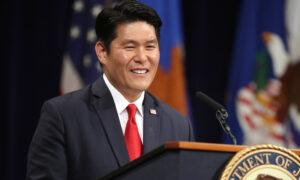During an almost-five-hour congressional hearing, Hur said multiple times that he did not exonerate President Biden over allegedly mishandling classified info.
Special Counsel Robert Hur said on March 12 that his report about President Joe Biden allegedly mishandling classified information did not exonerate the occupant of the Oval Office.
During an almost-five-hour House Judiciary Committee hearing, Mr. Hur said multiple times that, while he decided not to criminally charge the president, the report did not clear him of wrongdoing—a contradiction of the committee’s ranking member, Rep. Jerry Nadler (D-N.Y.), and Rep. Pramila Jayapal (D-Wash.) saying otherwise.
“I need to go back and make sure that I take note of a word that you used, ‘exoneration,’“ said Mr. Hur. ”That is not a word that we used in the report, and that’s not part of my task as a prosecutor.
“The judgment that I received, that I ultimately reached, was whether sufficient evidence existed such that the likely outcome would be a conviction,“ he continued. ”I did not exonerate him.”
In his 388-page report, Mr. Hur said he decided not to prosecute President Biden over his alleged mishandling of classified materials because a jury would likely not convict him due to his poor memory—an issue cited throughout his report, which was issued on Feb. 8.
“My assessment in the report about the relevance of the president’s memory was necessary and accurate and fair,” said Mr. Hur in his opening statement before the committee.
“Most importantly, what I wrote is what I believe the evidence shows and what I expect jurors would perceive and believe,” he continued.
“I did not sanitize my explanation. Nor did I disparage the president unfairly. I explained to the attorney general my decision and the reasons for it. That’s what I was required to do.”
In transcripts released on March 12 of Mr. Hur’s two-day interview with President Biden in October, the president repeatedly displayed his cognitive decline, such as not remembering that he was vice president on April 20, 2009—exactly three months after his inauguration.
Mr. Hur’s report found evidence that President Biden “willfully retained” and shared highly classified information after his vice presidency when he was a private citizen. However, he determined that the evidence didn’t support charging the president.
“Because the evidence fell short of that standard, I declined to recommend criminal charges against Mr. Biden,” he said in his opening remarks.
During the hearing, Rep. Ken Buck (R-Colo.), who had just announced that he would resign from Congress next week rather than serve out his term, pressed Mr. Hur on what would constitute willfully retaining classified information.
Mr. Buck noted that President Biden said he found classified information in his Virginia home in 2017 when he was with his ghostwriter, Mark Zwonitzer.
President Biden forgot about the documents, and therefore, a jury could be convinced that the president did not intentionally withhold the classified materials, according to Mr. Hur.
Another rationale for President Biden not wilfully holding onto classified information, said Mr. Hur, is that his staff could have been moving the boxes of such materials to multiple locations, including his Virginia home and residences in Delaware.
Yet what captured the greatest attention in the special counsel’s report was its depiction of the president’s mental fitness. In his report, Mr. Hur included a highly critical evaluation of the 81-year-old president, describing him as “a sympathetic, well-meaning, elderly man with a poor memory.”
During the hearing, Republican committee members decried what they say is a two-tiered justice system, given Special Counsel Jack Smith’s decision to charge former President Donald Trump for allegedly mishandling classified documents while Mr. Hur decided not to charge President Biden for allegedly doing the same.
‘Stark Contrast’
However, Rep. Veronica Escobar (D-Texas) said during the hearing that there is a “stark contrast” between those two cases.
In response to Ms. Escobar’s questions, Mr. Hur said he was not aware of thousands of people accessing President Biden’s residence, whereas there are that many people at President Trump’s Mar-a-Lago estate.
Whereas Mar-a-Lago—where classified materials were confiscated during an FBI raid in August 2022—is accessible to tens of thousands of people, President Biden’s home was not accessible to that many people and, therefore, the chances of exposure to those without permission to access classified information at the latter location was significantly lower than at the former, said Mr. Hur.
Unlike at Mar-a-Lago, President Biden did not host movie premiers where classified documents were stored there, said Mr. Hur.
Mr. Hur did not see that President Biden ordered staff to move boxes of classified materials, unlike President Trump, who allegedly ordered his personal aide, Walt Nauta, to do so. Like President Trump, Mr. Nauta has been criminally charged in the Mar-a-Lago classified documents case.
Moreover, Ms. Escober noted that through another line of her rhetorical questioning, President Biden immediately notified the Department of Justice upon finding classified documents at his residence, whereas President Trump did not at Mar-a-Lago.
President Biden was cooperative with the U.S. government, whereas President Trump was not, said Ms. Escobar.
Despite criticizing Mr. Hur’s decision not to charge President Biden, several Republicans, including Reps. Kevin Kiley (R-Calif.) and Nathaniel Moran (R-Texas), praised Mr. Hur for what they said was a thorough report.
Samantha Flom contributed to this report.
Original News Source Link – Epoch Times
Running For Office? Conservative Campaign Consulting – Election Day Strategies!


